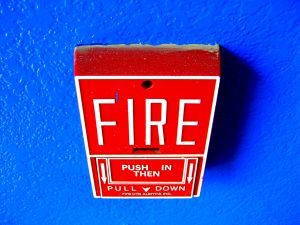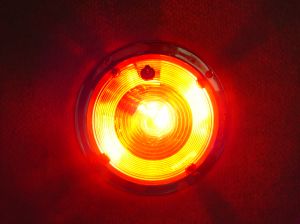Fire Alarm Systems

Like their name suggests, fire alarm systems are meant to alert people on the threat of a fire and enable them to get to safety on time. There are two main types of fire alarm systems available:
- heat detectors and
- smoke detectors
Heat detectors are designed to detect temperature changes which makes sense considering that fire always produces heat. However, since a larger fire is necessary to raise the room temperature enough to trigger an alarm, heat detectors cannot be used as an alternative to smoke detectors which go off a lot sooner. Instead, they are used to detect a fire in kitchen, and areas such as garage, attic, etc. where smoke detectors are not recommended.
Smoke detectors are the most common type of fire alarm systems. They have been proven very effective because in most cases, a sufficient amount of smoke is generated to trigger an alarm before the fire goes out of control.
According to technology used to detect smoke, these fire alarm systems can be divided into:
Ionisation smoke alarms. This type of fire alarms triggers a loud sound which alerts everyone in the building on a potential fire by detecting invisible fumes which are caused by combustion. It is an effective fire alarm as it often detects fire before visible smoke is produced. Ionisation smoke alarms are also relatively inexpensive in comparison to the second type available, however, they are also more likely to trigger false alarms.

Photoelectric smoke alarms. In contrary to ionisation smoke alarms, this type of fire alarms works by “seeing” the smoke. It is made with a light sensor which reacts to changes in the light beam which are caused by smoke particles. These smoke detectors are less susceptible to false alarms but it is highly important to keep them clean to avoid false alarms due to dust particles. Also, it works best for fires which generate lots of smoke.
Besides choosing between the two types of fire alarms mentioned above, you can also choose between two types of alarms according to the power source they use - battery powered and hard-wired alarms. Those that are powered by batteries will obviously need periodic battery replacement, typically once per year. Hard-wired alarms that are directly connected to the electric supply are most certainly more convenient, however, they will not work during eventual power cuts. For that reason most fire safety officials recommended installation of a combination of both types of smoke detectors or to choose a hard-wired alarm with a back-up battery. Also, if you live with a deaf or hearing impaired person, you are recommended to buy a smoke detector which triggers both sound and visual alarm.
Regardless of which fire alarm system you choose, be sure to follow the manufacturer’s instructions about proper maintenance and test it on a regular basis to make sure that it is working. And of course, follow the basic fire prevention measures and never ignore a fire alarm.